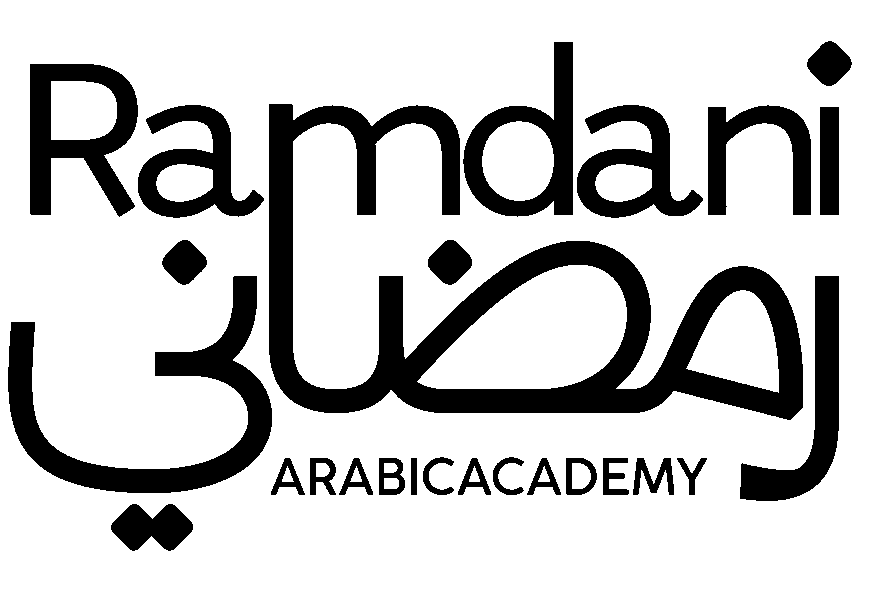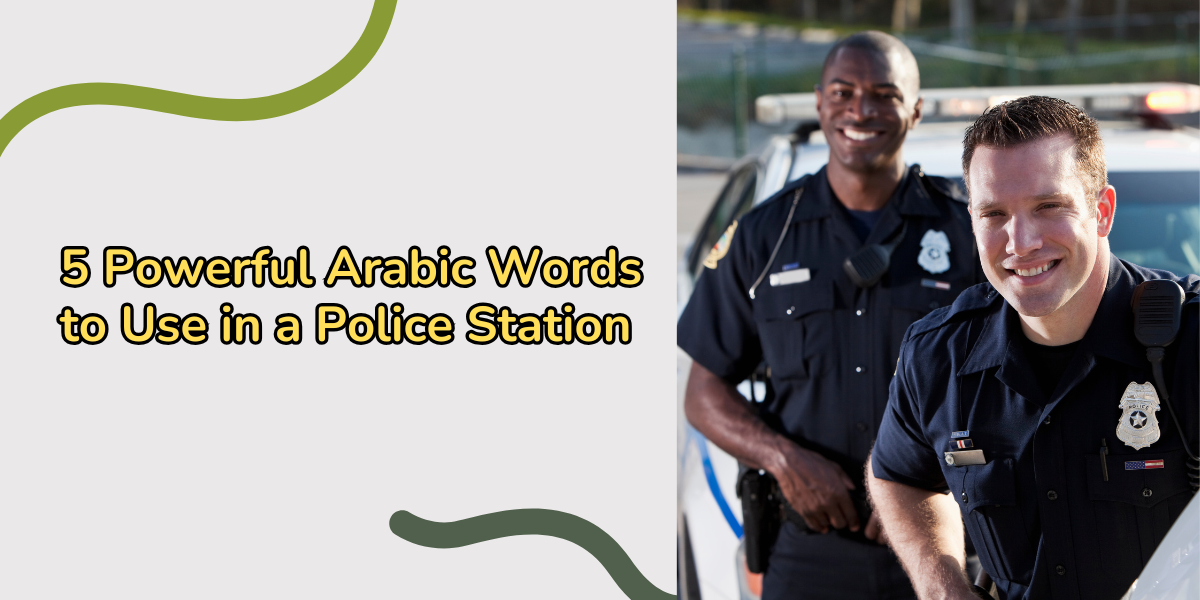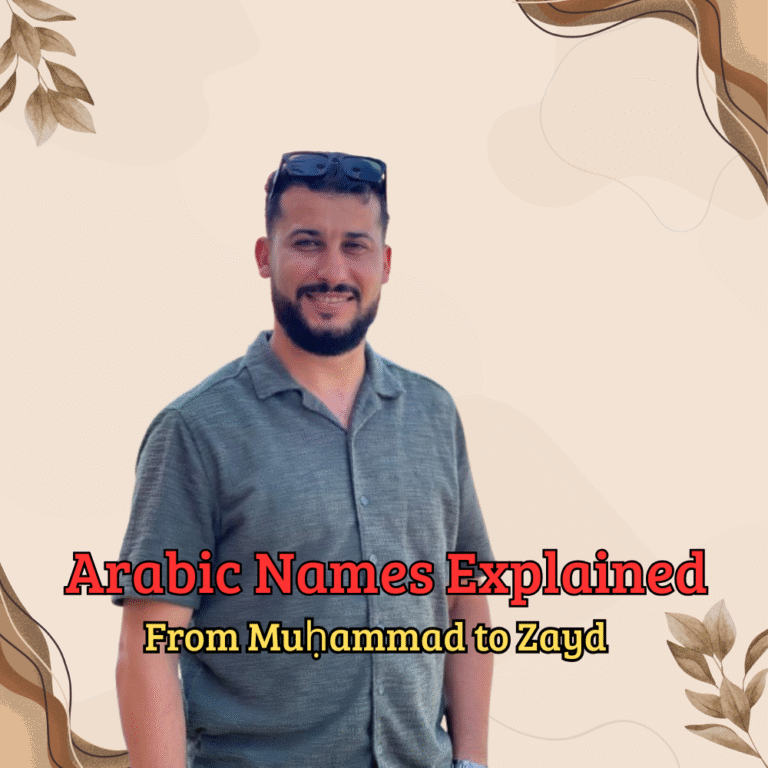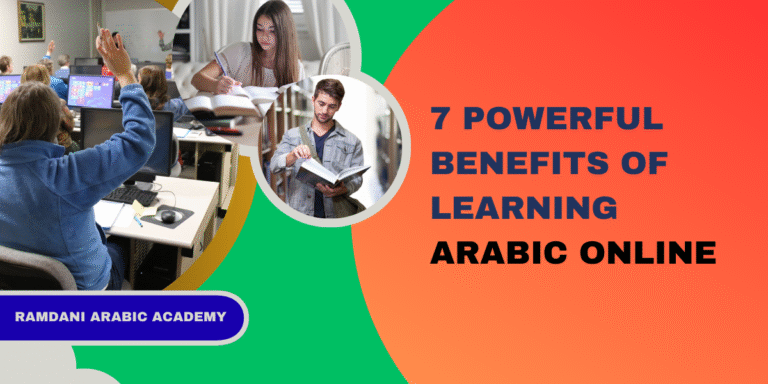5 Powerful Arabic Words to Use in a Police Station
Learning Arabic opens many doors. It helps you travel, study, work, and connect with people across the Arab world. But there is one situation that often surprises learners — visiting or speaking at a police station. You might not plan for it, but life can take unexpected turns. Maybe you lose your passport. Maybe you witness an accident. Maybe you need to report something important. In these moments, knowing a few useful Arabic words can make a big difference.
Arabic used in official places like a police station is different from the Arabic you hear in casual talks. Officers use clear and formal Modern Standard Arabic or a local dialect, depending on the country. If you understand some key words, you can explain yourself faster and avoid confusion. This article will guide you through five important Arabic words that can help you communicate in a police station. You will learn what they mean, how to use them, and when they are needed.
Many foreign visitors in Arab countries face language barriers when they deal with authorities. They try to use translation apps, gestures, or English, but these methods do not always work. Police officers respect people who make an effort to speak Arabic, even a few words. It shows respect for their language and culture. It also builds trust and helps them respond to your problem more effectively.
Think about it. You arrive in an Arabic-speaking country for the first time. You enjoy the markets, the food, the people. Then one day, your bag disappears. You go to the nearest police station. The officer asks you a few questions in Arabic. You hesitate. You search for words. Suddenly, you realize how important it is to know even simple phrases. This article will prepare you for that.
At Ramdani Arabic Academy, we believe language learning should be practical. Knowing how to greet someone or order coffee is useful, but real communication happens when you can handle real-life situations. The police station is one of them. It is a place where clear language can protect your rights and help you stay safe.
In the next parts, we will focus on five Arabic words that every learner should know before visiting a police station. Each word will come with examples and short explanations to make it easy to remember. Whether you are a traveler, a student, or someone working in an Arabic country, these words will help you feel more confident.
Arabic is not only about grammar and vocabulary. It is about understanding people and their systems. When you speak even a little Arabic at a police station, you show that you respect the rules and want to cooperate. That small effort can turn a stressful moment into a calm, clear conversation.
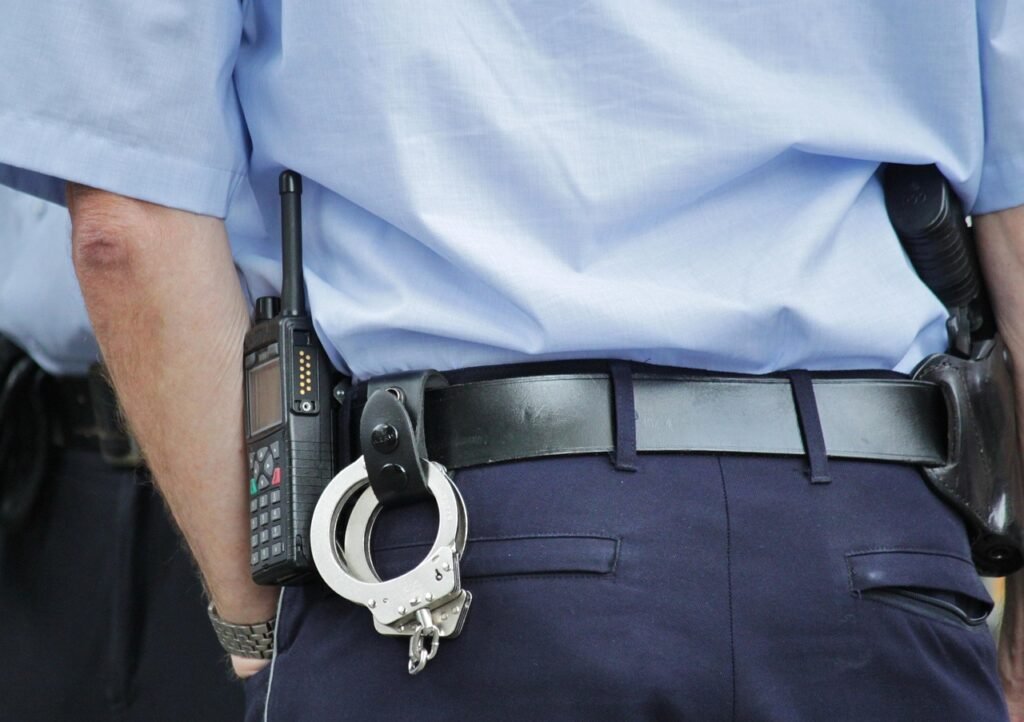
Let’s begin with the first word.
كلمة “بلاغ” (Balāgh)
When you enter a police station in any Arabic-speaking country, one of the first words you might hear is “بلاغ” (balāgh).
This word means “report” — as in a statement made to the police about something that happened.
It is a key word in police communication because almost every interaction starts with a report.
If you lose your passport, you make a balāgh.
If you witness a crime, you make a balāgh.
If someone steals your car, you go to the station to file a balāgh.
The word comes from the Arabic root “بلغ” (balagha), which means “to reach” or “to deliver.”
So when you make a balāgh, you are delivering information to the authorities.
It’s a simple but powerful concept — you are bringing your problem to those responsible for handling it.
How it is used in real situations
When you enter a police station, you might hear an officer say:
- “هل تريد تقديم بلاغ؟” (Hal turīd taqdīm balāgh?) — “Do you want to file a report?”
The phrase taqdīm balāgh means “to submit a report.”
You can answer with “نعم، أريد تقديم بلاغ” (Na‘am, urīd taqdīm balāgh) — “Yes, I want to file a report.”
Another common phrase is:
- “عن ماذا البلاغ؟” (ʿan mādhā al-balāgh?) — “What is the report about?”
The officer wants to know what happened — theft, loss, or another issue.
If you need to explain that you lost something, you can say:
- “فقدت جواز سفري وأريد تقديم بلاغ” (Faqadtu jawāz safari wa urīd taqdīm balāgh) — “I lost my passport and I want to file a report.”
Knowing this one word can change how the officer treats you.
When you say balāgh, you show that you understand how the system works.
You are not just a confused visitor; you are a person who knows what you need.
Cultural insight
In many Arab countries, formality and politeness are important, especially in official places.
Using the word balāgh shows respect for the procedure.
It signals that you are ready to follow the proper steps.
Police officers appreciate that because it makes their work easier.
They see that you are not arguing or panicking; you are following the process.
Grammar note
The word balāgh is a noun.
When you use it with a verb, the most common combination is “taqdīm balāgh” — “to file a report.”
The verb taqdīm means “to present” or “to submit.”
Together, they create a phrase often used in police paperwork and formal speech.
Example:
- “ذهبت إلى مركز الشرطة لتقديم بلاغ عن سرقة”
Dhahabtu ilā markaz al-shurṭa li-taqdīm balāgh ʿan sariqa
“I went to the police station to file a report about a theft.”
Why this word matters
Most foreigners in Arab countries face small but stressful problems — lost documents, phone theft, or traffic issues.
When you know the word balāgh, you can take control.
You don’t wait for someone to interpret for you.
You walk in and say clearly what you need.
That small step earns respect and saves time.
When our students at Ramdani Arabic Academy learn practical vocabulary, we always start with words that protect and empower them.
Balāgh is one of those words.
It is short, easy to remember, and directly useful in real life.At the end of this article, you will know five such words — but balāgh is the foundation.
It is your first bridge to understanding how Arabic-speaking police systems communicate.
If you remember only one word today, let it be this one.
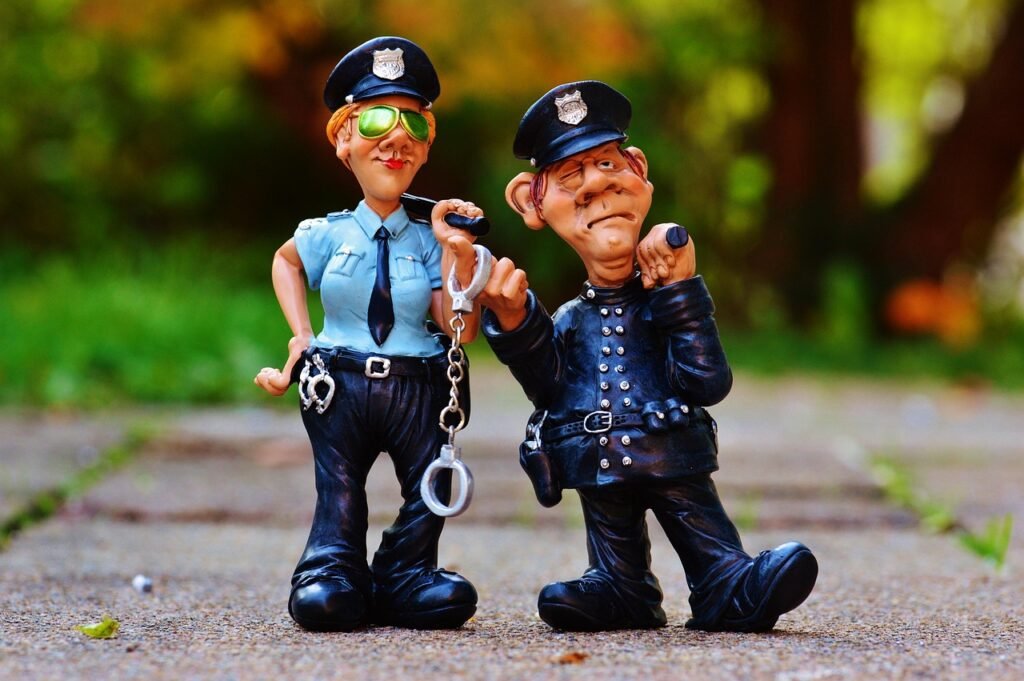
كلمة “تحقيق” (Taḥqīq)
Another word you will hear often in a police station is “تحقيق” (taḥqīq).
It means “investigation” or “interrogation”, depending on the context.
The root of the word is “حق” (ḥaqq), which means “truth” or “right.”
So, taḥqīq literally means “the process of finding the truth.”
It is one of the most important words in Arabic police language.
When a crime happens, the police start a taḥqīq.
They collect information, talk to witnesses, and write reports.
If you are involved, even as a victim or witness, you may be asked to give a statement during the taḥqīq.
How it is used in real situations
You might hear an officer say:
- “نحن نقوم بالتحقيق في القضية.” (Naḥnu naqūmu bi-t-taḥqīq fī al-qaḍiyya) — “We are conducting an investigation in the case.”
This tells you that the police are still working to understand what happened.
If the officer asks you questions, you might hear:
- “هذا جزء من التحقيق.” (Hādhā juz’ min at-taḥqīq) — “This is part of the investigation.”
It means you are giving information to help them reach the truth.
If you are waiting for results, you could ask:
- “هل انتهى التحقيق؟” (Hal intahā at-taḥqīq?) — “Has the investigation finished?”
The word taḥqīq can sound serious, but it is not always negative.
Sometimes, it simply means “checking” or “verifying.”
For example, if you submit documents, the officer might say:
- “نحتاج إلى التحقيق في صحة الأوراق.” (Naḥtāj ilā at-taḥqīq fī ṣiḥḥat al-awraq) — “We need to verify the validity of the papers.”
Cultural insight
In Arab countries, the police process can feel formal and structured.
When you hear taḥqīq, it means things are moving through official steps.
Understanding this word helps you stay calm.
You realize that the officers are not accusing you; they are doing their job.
If you respond politely and clearly, they will respect your cooperation.
Many foreigners get nervous when they hear taḥqīq because it sounds like something serious.
But in reality, it is just the legal term for “investigation.”
The same way police in English-speaking countries say “we’re investigating the case,” Arabic officers say naḥnu naqūmu bi-t-taḥqīq.
Grammar note
Taḥqīq is a noun.
You can use it with verbs like qāma bi- (to carry out) or bada’a (to start).
For example:
- “بدأت الشرطة التحقيق في الحادث.”
Bada’at ash-shurṭa at-taḥqīq fī al-ḥādith.
“The police started the investigation into the incident.”
You can also say:
- “تم التحقيق مع الشاهد.”
Tamma at-taḥqīq maʿa ash-shāhid.
“The witness was questioned.”
Why this word matters
When you understand taḥqīq, you understand the rhythm of the police process.
You know when a case is active, when it’s under review, and when it’s closed.
You can ask smart questions and follow what’s happening.
This knowledge reduces fear and confusion.
At Ramdani Arabic Academy, we teach our students to focus on comprehension, not memorization.
When you know the roots and structure of words like taḥqīq, you can guess the meaning of other related words, such as “محقق” (muḥaqqiq) — “investigator” — or “تحقيقات” (taḥqīqāt) — “investigations.”
It gives you more control over real conversations.Arabic at a police station is not about fancy grammar.
It’s about survival communication — words that keep you informed, safe, and confident.
Taḥqīq is one of those words that turn confusion into clarity.
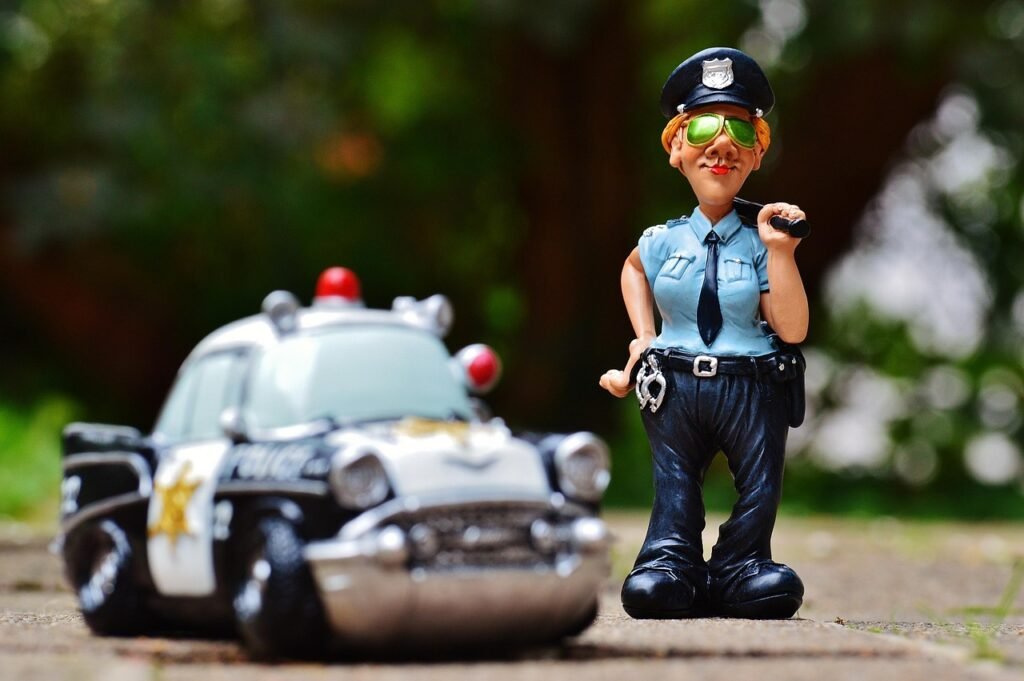
كلمة “هوية” (Hawiyya)
The third word you will hear in almost every police station is “هوية” (hawiyya).
It means “identity” or “identification”.
It comes from the root “هو” (huwa), which means “he” or “self.”
So, hawiyya is what defines who you are.
It refers to your ID card, passport, or any document that proves your identity.
If you walk into a police station, this will probably be the first question you hear:
“هل معك هوية؟” (Hal ma‘aka hawiyya?) — “Do you have identification?”
It is a standard question.
Every person who reports an issue or gives a statement must show identification.
How it is used in real situations
If you are reporting something, the officer will ask for your ID before filling out a form.
You might hear:
- “من فضلك، أظهر هويتك.” (Min faḍlik, aẓhir hawiyyatak) — “Please show your ID.”
- “نحتاج إلى نسخة من الهوية.” (Naḥtāj ilā nuskhah min al-hawiyya) — “We need a copy of your ID.”
If you lose your passport, you might say:
- “فقدت هويتي.” (Faqadtu hawiyyatī) — “I lost my ID.”
This tells the officer that you lost an important document, not just any paper.
Sometimes, you may hear the phrase “بطاقة الهوية” (biṭāqat al-hawiyya) — which means “identity card.”
In some countries, people simply say al-bīṭāqa for short.
For example:
- “أين بطاقتك؟” (Ayna biṭāqatuk?) — “Where is your ID card?”
Cultural insight
In most Arab countries, carrying identification is required by law.
Police officers may ask for it at any time, not only in the station.
It is not seen as rude or suspicious.
It is part of normal procedure.
So when you hear hawiyya, don’t feel nervous — it’s a routine check.
If you cannot show your ID, explain calmly what happened.
For example:
“فقدت جواز سفري ولا أملك هوية الآن.” (Faqadtu jawāz safari wa lā amliku hawiyya al-ān.)
“I lost my passport and I don’t have ID right now.”
Speaking politely and using the right words helps you avoid problems.
Grammar note
Hawiyya is a noun that refers to identity or an ID document.
It takes possessive endings to show ownership:
- hawiyyatī — my ID
- hawiyyatuka — your ID (for a man)
- hawiyyatuki — your ID (for a woman)
Example:
- “أعطيت الضابط هويتي.”
A‘ṭaytu aḍ-ḍābiṭ hawiyyatī.
“I gave the officer my ID.”
You can also use it in a more abstract way, meaning “identity” in general, such as cultural or personal identity:
“اللغة جزء من الهوية.” (Al-lugha juz’ min al-hawiyya.) — “Language is part of identity.”
But in a police context, it always refers to your physical ID card or passport.
Why this word matters
Knowing how to use hawiyya helps you in daily life, not only in police stations.
You might need it at airports, government offices, or hotels.
It’s one of the most practical words you can learn.
If you can say “hawiyya,” officers will immediately understand that you know the system.
At Ramdani Arabic Academy, we often teach this word in our beginner courses.
It connects language learning with real-life needs.
Many students tell us that the first Arabic word they used in public was hawiyya, when an officer or security guard asked for their ID.
It is a word that gives you confidence.
You can speak clearly and respond correctly.Arabic learning is not only about reading books.
It is about using words that work in real situations.
Hawiyya is one of those words — short, simple, and useful in any Arabic-speaking country.
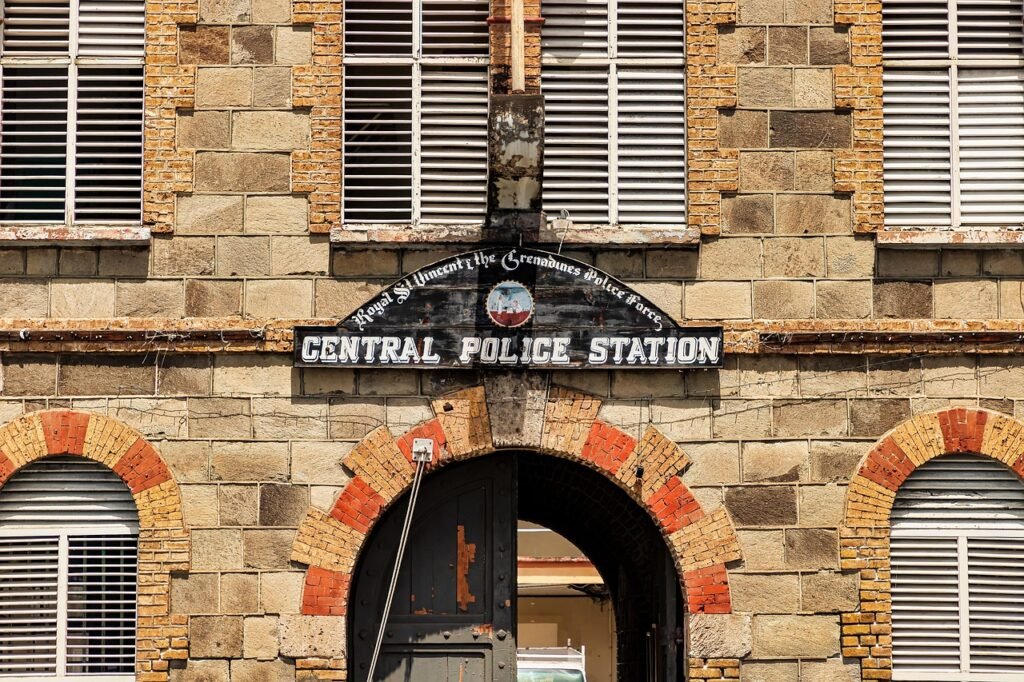
كلمة “قضية” (Qaḍiyya)
The fourth word you will often hear in a police station is “قضية” (qaḍiyya).
It means “case” or “legal matter.”
Whenever an incident or dispute is reported, it becomes a qaḍiyya.
It could be a theft case, an accident case, or a missing-person case.
Every balāgh — report — can turn into a qaḍiyya once the police start working on it.
The word comes from the Arabic root “قضى” (qaḍā), which means “to decide” or “to judge.”
So a qaḍiyya is something that needs a decision or judgment.
It connects directly to the justice system — police, courts, and law.
How it is used in real situations
At a police station, you might hear:
- “القضية ما زالت قيد التحقيق.” (Al-qaḍiyya mā zālat qayd at-taḥqīq.) — “The case is still under investigation.”
- “تم إغلاق القضية.” (Tamma ighlāq al-qaḍiyya.) — “The case has been closed.”
- “هل لديك رقم القضية؟” (Hal ladayka raqm al-qaḍiyya?) — “Do you have the case number?”
If you are reporting a theft, you might say:
“أريد معرفة حالة القضية.” (Urīd maʿrifat ḥālat al-qaḍiyya.) — “I want to know the status of the case.”
This shows that you understand how the system tracks and follows reports.
Police stations in Arab countries often file every incident under a case number.
That number is your link to updates, documents, or follow-ups.
Knowing the word qaḍiyya allows you to ask about your case clearly without needing translation.
Cultural insight
In Arab legal systems, the word qaḍiyya is not limited to police work.
It is also used in courts and media.
For example, news headlines might say:
“قضية فساد” (qaḍiyyat fasād) — “corruption case,” or
“قضية قتل” (qaḍiyyat qaṭl) — “murder case.”
At the police level, it simply means “filed report under review.”
When the investigation ends, the qaḍiyya might move to the prosecutor or court if legal action is needed.
When you speak to officers, using the word qaḍiyya shows that you know how official systems operate.
It also helps you ask precise questions like “Is my case still open?” or “Has my case been sent to court?”
It replaces long explanations with one clear term.
Grammar note
Qaḍiyya is a feminine noun.
The plural form is “قضايا” (qaḍāyā), which means “cases.”
For example:
- “تعمل الشرطة على عدة قضايا.” (Taʿmal ash-shurṭa ʿalā ʿiddat qaḍāyā.) — “The police are working on several cases.”
You can also use it with descriptive words:
- “قضية سرقة” (qaḍiyyat sariqa) — “theft case.”
- “قضية مرور” (qaḍiyyat murūr) — “traffic case.”
- “قضية اختفاء” (qaḍiyyat ikhtifāʾ) — “missing-person case.”
Why this word matters
When you visit a police station, you are part of a process.
The report you file (balāgh) turns into a qaḍiyya.
It then goes through taḥqīq (investigation).
Understanding these terms helps you follow what happens step by step.
You know what stage your problem is in and who is responsible next.
At Ramdani Arabic Academy, we teach qaḍiyya as part of our “Arabic for Real-Life Situations” course.
Students learn not only the word but also how to use it in official conversations.
They practice dialogues like:
“ذهبت إلى مركز الشرطة لسؤال عن قضيتي.” (Dhahabtu ilā markaz ash-shurṭa li-suʾāl ʿan qaḍiyyatī.) — “I went to the police station to ask about my case.”
When you know qaḍiyya, you move from being a visitor to being an informed participant in communication.
You can track your report, understand updates, and talk confidently with officers.Language gives you control.
Knowing this single word helps you take part in any official discussion about your situation without confusion.
كلمة “شاهد” (Shāhid)
The fifth word you will often encounter in a police station is “شاهد” (shāhid).
It means “witness.”
A shāhid is someone who saw an event happen and can provide information about it.
In police work, witnesses are essential because they help officers understand what occurred.
Even if you are not directly involved, you might be called a shāhid if you saw something important.
The root of the word is “شهد” (sha-hada), which means “to witness” or “to testify.”
This root also appears in words like shahāda (testimony) and mashhūd (observed).
Understanding the root helps learners connect different legal and official terms in Arabic.
How it is used in real situations
When you enter a police station after witnessing an incident, an officer might ask:
- “هل كنت شاهدًا على الحادث؟” (Hal kunt shāhidan ʿalā al-ḥādith?) — “Were you a witness to the incident?”
If you are a witness, you can respond:
- “نعم، كنت شاهدًا.” (Naʿam, kuntu shāhidan.) — “Yes, I was a witness.”
Sometimes officers ask you to give a statement:
- “أرجو أن تدلي بشهادتك.” (Arjū an tudlī bi-shahādatik.) — “Please provide your testimony.”
In this sentence, shahāda comes from the same root as shāhid.
If you did not see the event directly, you can politely say:
- “لم أكن شاهدًا على الحادث.” (Lam akun shāhidan ʿalā al-ḥādith.) — “I was not a witness to the incident.”
Cultural insight
In Arab countries, witnesses play an important role in both police investigations and court cases.
Being a shāhid carries responsibility.
Police take witness statements seriously, and providing accurate information is valued.
If you are honest and clear, it helps the investigation and prevents misunderstandings.
Using the word shāhid shows that you understand the situation and are willing to cooperate.
It is a small but important sign of respect toward official procedures.
Even knowing how to say it politely can make your interaction smoother.
Grammar note
Shāhid is a masculine noun.
The feminine form is “شاهدة” (shāhida).
The plural forms are:
- Masculine plural: shuhadā’ (شُهَداء)
- Feminine plural: shāhidāt (شاهدات)
Example sentences:
- “الشاهد قدم معلومات مهمة للشرطة.”
Al-shāhid qaddama maʿlūmāt muhimmah li-l-shurṭa.
“The witness provided important information to the police.” - “الشاهدات رأين الحادث من نافذة المبنى.”
Al-shāhidāt raʾayna al-ḥādith min nāfidhat al-mabnā.
“The female witnesses saw the incident from the building’s window.”
Why this word matters
Knowing shāhid helps you communicate accurately about your role in an incident.
You can explain whether you saw something, give testimony, or clarify your involvement.
It reduces confusion and helps officers process your information correctly.
At Ramdani Arabic Academy, we emphasize words like shāhid because they have practical use.
Students who learn it feel prepared for real situations — not just theoretical lessons.
When you can identify yourself as a shāhid or describe witnesses correctly, you navigate police interactions with confidence.Understanding this word completes the set of five essential Arabic words for the police station.
Together with balāgh, taḥqīq, hawiyya, and qaḍiyya, you have the tools to communicate clearly and handle official situations in Arabic-speaking countries.
Fina word
Visiting a police station in an Arabic-speaking country can feel intimidating.
You may worry about language barriers, misunderstandings, or paperwork.
But knowing a few key words can make all the difference.
The five words we discussed — بلاغ (balāgh), تحقيق (taḥqīq), هوية (hawiyya), قضية (qaḍiyya), and شاهد (shāhid) — give you the tools to navigate official situations.
Each word has a clear purpose:
- Balāgh lets you report an incident.
- Taḥqīq helps you understand the investigation process.
- Hawiyya ensures you can provide proper identification.
- Qaḍiyya connects your report to the legal system.
- Shāhid allows you to define your role as a witness.
Knowing these words not only helps you communicate, but also builds confidence.
When you speak Arabic in a police station, even a few words, officers see that you respect their language and system.
This respect makes interactions smoother and faster.
It reduces stress, helps your case move efficiently, and avoids misunderstandings.
Here are some practical tips when dealing with police in Arabic-speaking countries:
- Carry identification at all times.
- Speak slowly and clearly.
- Repeat important information if necessary.
- Stay polite and formal.
- Write down key details to help remember Arabic terms.
At Ramdani Arabic Academy, we focus on practical Arabic that works in real-life situations.
Our courses are designed to give learners words and phrases they can immediately use.
Whether traveling, working, or living in an Arabic-speaking country, our goal is to make language a tool, not a barrier.
As the founder, I, Ramdani Mohamed, created this academy to help learners like you connect with the Arabic language meaningfully.
I have seen students gain confidence after learning a few practical words and phrases that make their daily interactions easier.
This article is part of our effort to teach Arabic that matters, not just vocabulary you might never use.
Arabic is not only about grammar or textbooks.
It is about communication, understanding, and navigating the world safely.
By learning these five words, you take control of situations that might otherwise feel overwhelming.
You prepare yourself for emergencies, official procedures, and real-life conversations.
Learning Arabic is a journey. Start small, focus on practical words, and apply them in real situations.
These five words are a step toward mastering Arabic that protects you and connects you to the culture around you.At Ramdani Arabic Academy, we are here to guide you, provide courses, lessons, and resources so your Arabic learning is meaningful, practical, and effective.
Remember, even a small effort to learn a few key words can make a big difference in your safety, confidence, and understanding.
